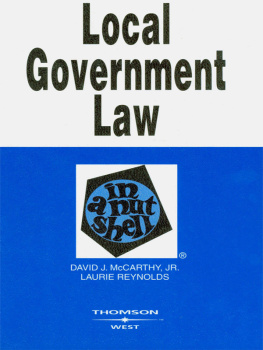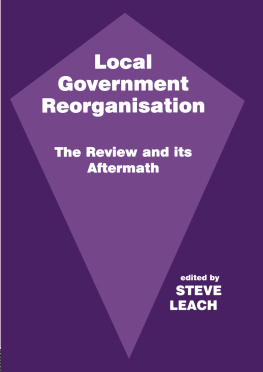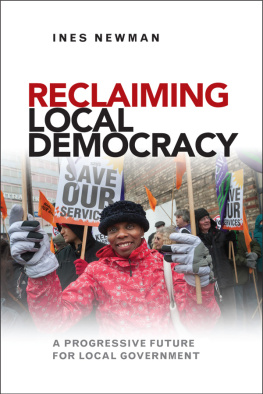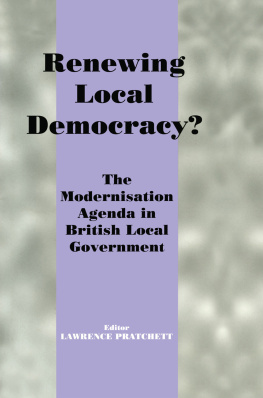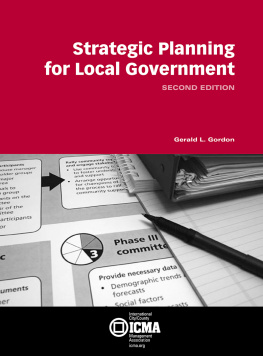Routledge Revivals
English Prisons Under Local Government
First published in 1963 by Longmans Green & Co.
This edition first published in 2018 by Routledge
2 Park Square, Milton Park, Abingdon, Oxon, OX14 4RN
and by Routledge
52 Vanderbilt Avenue, New York, NY 10017, USA
Routledge is an imprint of the Taylor & Francis Group, an informa business
1963 by Taylor and Francis
All rights reserved. No part of this book may be reprinted or reproduced or utilised in any form or by any electronic, mechanical, or other means, now known or hereafter invented, including photocopying and recording, or in any information storage or retrieval system, without permission in writing from the publishers.
Publishers Note
The publisher has gone to great lengths to ensure the quality of this reprint but points out that some imperfections in the original copies may be apparent.
Disclaimer
The publisher has made every effort to trace copyright holders and welcomes correspondence from those they have been unable to contact.
A Library of Congress record exists under ISBN:
ISBN 13: 978-1-138-39224-3 (hbk)
ISBN 13: 978-1-138-39227-4 (pbk)
ISBN 13: 978-0-429-40228-9 (ebk)
English Local Government
English Prisons Under Local Government
ENGLISH LOCAL GOVERNMENT
A series of eleven volumes on the growth and structure of English Local Government by SIDNEY and BEATRICE WEBB
VOLUME 1 The Parish and the County.
VOLUMES 2 and 3 The Manor and the Borough.
VOLUME 4 Statutory Authorities for Special Purposes.
With a new introduction by B. KEITH-LUCAS
which is included in Volume 1. The Parish and the County.
VOLUME 5 The Story of the Kings Highway.
With a new introduction by G. J. PONSONBY .
VOLUME 6 English Prisons Under Local Government.
Including a long preface by G. B. Shaw.
With a new introduction by L. RADZINOWICZ .
VOLUME 7 English Poor Law History, Part 1.
The Old Poor Law.
VOLUMES 8 and 9 English Poor Law History. Part 2.
The Last Hundred Years. Volumes 1 and 2.
* VOLUME 10 English Poor Law Policy.
With a new introduction by W. A. ROBSON
which is included in Volume 7, English Poor Law History, Part 1,
The Old Poor Law.
* VOLUME 11 The History of Liquor Licensing in England.
* Volumes 10 and 11 were originally published separately, but are now included to make the scope of the work more comprehensive.
English Local Government Volume 6
English Prisons Under Local Government
SIDNEY and BEATRICE WEBB
With a Preface by Bernard Shaw
With a new Introduction by
LEON RADZINOWICZ
Wolfson Profetsor of Criminology in the University of Cambridge
First published by Longmans Green & Co. in 1922
This edition published by F RANK C ASS & Co., 10, Woburn Walk, London, W.C.I., by the kind permission of the Trustees of the Passfield Estate.
First published 1922
Reprinted 1963
Printed in Great Britain by Charles Birchall & Sons Ltd., Liverpool and bound by Thomas Nelson and Sons Ltd, Edinburgh
Contents
BY L EON R ADZINOWICZ
BY B ERNARD S HAW
On the 31st December, 1800, Parliament passed an enactment which authorised, for the first time, a census of population in England. The objection that it would involve an unjustifiable interference on the part of the State was overruled. This step has been described by the social historian, Kirkman Gray, as the first official recognition of the duty of the State to know in detail the vital, cultural and economic condition of the whole nation. Once a state has assumed the duties of knowing, he concludes, it accepts an obligation to act upon that knowledge, to initiate many forms of social service.
The principle of state intervention had been given its first recognition, but in practice it still meant very little. For a long time the starkest of social evils created by the industrial revolution went unperceived, and when perceived they were handled in a way which bore no relation to their magnitude and complexity. For fifty years, to quote Dr. Trevelyan, that great change was left uncontrolled by the community which it was transforming. So new was the experience, that for a while the wisest were as much at fault as the most foolish. Burke for all his powers of prophecy, Pitt for all his study of Adam Smith, Fox for all his welcome to the new democracy, no more understood the English economic revolution, and no more dreamt of controlling it for the common good, than George III himself.
As long as social standards were not raised, it was vain to expect advances in the penal system. Penal standards depend largely upon the prevailing level of social conditions and the pace of penal reform is largely determined by progress in social reform. To trace this interaction in detail would be beyond the scope of an introduction, but some of the more significant links may be touched upon. Whilst the human effects of economic change were ignored in the community of large it was not surprising that prisons remained much as John Howard had found them in 1777. In his memorable survey, the 518 gaols in England and Wales, nominally belonging to the Crown, but in practice under a variety of authorities, were condemned as hot-beds of corruption, nurseries of crime and havens of vice, constituting a living scandal and a challenge to conscience. Gaol keeping had often been a business, out of which the gaoler, a private individual, earned a living. Otherwise such places of confinement were under the charge, lax or extortionate, of the justices of the peace.
And just as neither the administration of the poor law nor the doling out of private charity discriminated between the varying needs and natures of the poor, tending to reduce all to a degraded mass, so in the prisons we find the same lack of imagination, with a demoralisation even harder to escape. In only twenty-three of the five hundred and eighteen gaols were the inmates classified according to regulations. In fifty-nine there was no segregation whatever, even according to sex; in a hundred and thirty-six there was but one division, and in nearly four-fifths there was no employment of any kind. Prison reform, conceived on the most modest scale, seemed to defeat even Peels administrative vision and determination.
Into these conditions were thrust offenders and suspected offenders of all ages. In 1816, when the population of London was a little less than a million and a half, its prisons contained over three thousand offenders below twenty years of age, half of whom were under seventeen. How could attention be spared for children in prison when it was not until 1833 that the first measures were taken to inspect the conditions of those in factories? The first Inspectors of Prisons were appointed two years later.
By that time, however, the social scene was changing rapidly. A series of parliamentary enquiries, altogether remarkable for the thoroughness and fairness of their reports, was set on foot. They revealed an appalling state of affairs in public health, in education, in industry, in living conditions and in municipal government. Disraelis famous picture of The Two Nations was well authenticated. Yet within thirty years the Condition of the Working Class in England, which Frederick Engels had described in 1844 as an inevitable and permanent characteristic of a capitalist system, had been reshaped on so large a scale that it already belonged to past history.





